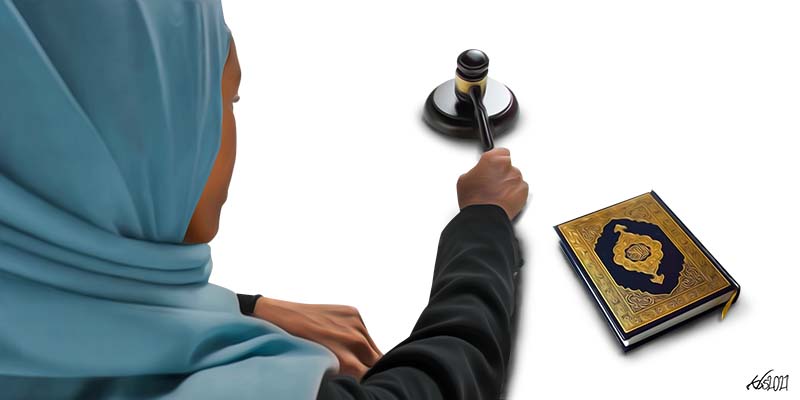Kadhi courts are arguably the oldest judicial institution in Kenya, being the judicial system prevailing in the Sultanate of Zanzibar that controlled a substantial portion of the East African coast.
In the 1963 agreement between Prime Minister Muhammad Shamte of Zanzibar and President Jomo Kenyatta of Kenya, the coastal strip was brought within the territorial jurisdiction of Kenya. In exchange, the Kenyan government would guarantee the preservation the Muslim religion and its institutions, courts, officers, schools, lands and the Arabic language within the new state.
Kadhi courts have thus been an integral part of the judiciary since pre-colonial times and were the focus of fierce contestations during the 2010 constitutional review process in Kenya.
Kadhis, especially the Chief Kadhis, have always been males, appointed from Muslim communities and from scholarly Arab Muslim families at the coast (the Saggafs, the Mazruis, the Bākathirs and the Barawa). After independence, Kadhis were also appointed from other non-coastal communities, notably the Somali.
Female Kadhi
Following the promulgation of the 2010 constitution, Kadhi courts now reflect the face of Kenya. In the last decade, the Judicial Service Commission (JSC) has recruited Kadhis from a pool of scholars of Islamic law, some hailing from such minority Muslim communities as the Maasai, the Agikuyu, the Ameru, the AbaGusii, the Turkana and the iTeso. Yet the gender composition of the courts remains unresolved, and it has become a topic of debate in the last few months.
It is not clear what has sparked the recent debates, but the impending retirement of the current Chief Kadhi, Hon. Ahmed Muhdhar, must have animated discussions among the various interest groups over the possibility of appointing a Chief Kadhi of non-Arab descent and the appointment of female Kadhis, both of which are unprecedented in Kenyan legal history.
The Kenya Muslim National Advisory Council (KEMNAC), led by Sheikh Juma Ngao, had in the months before the women Kadhis debate erupted called successive press conferences pitching for the appointment of a non-Arab Chief Kadhi.
The women Kadhis discussion only came to the fore after The Standard published an article asking whether the time was ripe for a female Kadhi. Another piece followed in The Nation. In early July 2021, the Garissa Township Member of Parliament, Hon. Aden Duale, weighed in on the question while addressing a gathering. He came out strongly in opposition to the appointment of women Kadhis. Duale wields immense authority among the Muslims of northern Kenya and his comments generated debate within the Muslim social spaces. I followed the debates closely and actively participated in some of the discussions, especially on Facebook. I documented some of the comments, followed almost every discussion on social media, on television and in the Friday Khutba sermons such as those by Sheikh Feisal Al–Amoody of Malindi and Ibrahim Lethome of Jamia Mosque Nairobi. Various sheikhs also commented on the debate in their darsas (mosque lessons), notably Al-Sayyid Ahmad Ahmad Badaway, aka Mwenye Baba, who is regarded by the Muslim faithful as one of the foremost religious authorities.
Contestation
The contestation over the appointment of female Kadhis in Kenya first arose during Chief Justice Willy Mutunga’s time at the judiciary. The Chief Justice, a known crusader for equality and human rights, openly backed the appointment of women to serve as Kadhis. Predictably, this put him on a collision course with the National Muslim Leaders Forum (NAMLEF) and the Supreme Council of Kenya Muslims (SUPKEM). Both strongly objected to such appointments. They occasionally used the Friday sermons to teach and remind Muslims of the position of Islamic jurisprudence on the appointment of female Kadhis. Sheikh Bahero of Bakarani Mosque, Mombasa, for example, dedicated khutba after khutba to this issue.
The latest debates have seen the two organizations take a measured approach while KEMNAC has taken centre stage in shaping the discourse. I can confirm that KEMNAC, Jamia Mosque Nairobi, SUPKEM and the Council of Imams and Preachers of Kenya (CIPK) have all written to the JSC urging that women should be not be appointed as Kadhis. So far, the only organ that has come out clearly in support of the appointment of women Kadhis is Muslims for Human Rights (MUHURI) led by Khelef Khalifa.
Perhaps the most eloquent opposition to the appointment of female Kadhis is from Hon. Aden Duale’s speech transcribed below:
We will not listen to what the NGOs will tell us. We will not listen to what government will tell us. We will not listen to what Western countries and powers will tell us. Sisi ni Waislamu, katiba yetu sisi ni hiyo kitabu ya Qur’an awwalan (We’re Muslims and our Constitution is that book of Qur’an first). Hii ingine ya Kenya inakuja second (This other one of Kenya comes second). We will not accept a woman to be a Kadhi. It is not found in the Qur’an, and it is not found in the teachings of the Prophet. Wakati wa nikaah, umeona mwanamke huko? (During marriage solemnization, do you see a woman there?). Islam has given the roles women can perform and the roles they cannot achieve. [Hon.] Martha Koome is a Chief Justice in a secular judiciary, and she is not a Chief Justice over religious organization or religious belief. Msijaribu kuweka mkono yenu katika (do not try to interfere in) how Islam is run in this country, the same way we will not allow you to run the Christian faith. We must leave it to the bishops. We must respect religious leaders kama nyinyi mnataka hii Kenya ikuwe nchi nzuri (If you want Kenya to be a nice country). . . .”
Such a speech conjures up images of past contestations over the inclusion of Kadhi courts in the 2010 constitution and raises questions as to whether the debate was concluded. Even though the Christian clergy who vehemently opposed the inclusion of the Kadhi courts in the 2010 constitution have moved on, some of the fears they raised at the time now seem to have caught up with Muslims.
The Jurists
As Duale stated, there is no specific Quránic verse or Hadith (Sayings) of the Prophet that approves of the appointment of women to the position of Kadhi or to any other position of leadership. The Hadith that says, “There shall not prosper a nation that appoints a woman to rule them,” is often quoted as a direct prohibition. There are verses of the Qur’an, like 4:34, that show men’s authority over women, and only in the story of the Queen of Saba (Sheba) is a woman seen to have power over men.
Some verses discourage women from mixing with men or appearing “unnecessarily” in public places. Further, the two-women-equals-one-man ratio in the inheritance law and in the law of testimony during evidentiary proceedings signifies, in the opinion of the majority of jurists, that the woman is not a man’s equal.
The only organ that has come out clearly in support of the appointment of women Kadhis is Muslims for Human Rights (MUHURI) led by Khelef Khalifa.
Furthermore, in the fourteen centuries of Islamic history no woman has been appointed to the position of judge (Kadhi). Then there is the Hadith that says a woman is deficient in intellect and religiosity, which is taken to warrant her disqualification from holding such an important office.
A majority of Muslim exegetes and jurists in the pre-modern era took to these arguments as a restatement of the law on this particular question: Women should obey their husbands, stay at home, and have no authority over men.
Another class of jurists has provided interpretations that seem more gender-egalitarian and have used historical, logical, textual and contextual nuances in the explanation of the texts relied upon by the first strand of jurists. Their discussions can be found in the studies by Prof Mohammad Fadel of the University of Toronto School of Law and by Dr Abdulkadir Hashim, a Senior Lecturer in the Department of Philosophy and Religious studies of the University of Nairobi.
All the verses and Hadith relevant to the question of female Kadhis are analysed in their two works using exegetical, hermeneutical and comparative perspectives. Fadel uses tools within the philosophy of Islamic jurisprudence to argue that appointing women as judges in Kadhi courts is possible even without resorting to extraneous sources of law for justification. On the other hand, Hashim uses both historical and comparative law approaches to answer this question while situating it within the immediate Kenyan context.
Women should obey their husbands, stay at home and should have no authority over men.
On comparative perspectives, there is a text titled Women Judges in the Muslim World: A Comparative Study of Discourse and Practice by Nadia Sonneveld and Monika Lindbekk. This work documents the practice of appointing Muslim women in Muslim majority countries to be judges, and even more specifically, Sharia court judges who are the equivalent of Kadhis.
These countries include Malaysia, Pakistan, Palestine and Indonesia. Most of these countries are, like Kenya, commonwealth-common law jurisdictions with a rich Islamic heritage and a robust jurisprudence. Islamic law forms part of its basic structure and can provide parameters for consideration in Kenya.
Pakistan, for example, has a Federal Shariat Court (FSC) that checks on the repugnancy of any law to the doctrines of Islam. Twice, a petition was filed to bar women from being appointed as judges using arguments from within the Islamic legal tradition. The FSC threw out both petitions.
Reflections on the female Kadhis debate
The female Kadhis debates have generated a few thoughts. First, most Muslims are not aware of the historical developments in the court across the years, the laws that regulate the functionality of the court, the recruitment procedures for Kadhis, and the status and place of Kadhis and Kadhi courts in the judicial structure in Kenya. One discerns from the discussions that they are speaking of an idealized Islamic court, in a historicised Islamic state far removed from modernity, globalization and the realities of the nation-state that is Kenya.
Second, secular-religious dialectics pop out in these discussions. There are questions as to whether the constitution is superior, or whether it is God’s law that is superior. Some other Muslims are asking whether Kadhis are judicial officers performing religious duties or religious leaders performing secular judicial functions, or even both.
Third is the crisis of Islamic scholarship and religious authority in Kenya, something that has been alluded to in the past. Unlike the Catholic Church, for example, Muslims do not have a papal figurehead. Their religious and legal authority derives from allegiance to the Qur’an, the Hadith and the interpretation of these sources by Muslim jurists of the four schools of law across the centuries and geographies. Muslim states, and some Muslim minority states such as Uganda, have an official Mufti who is the ultimate authority on issues at the intersection of religion and governance.
On the particular question of female Kadhis, there was a whole mix of people attempting to issue a fatwa on a question that no one, not even the JSC, raised. The rules of fatwa in the Islamic legal tradition are that there must be someone or an entity that asks a question seeking legal interpretation. A juristic authority must exist to answer the question authoritatively. Neither has the JSC asked anyone to provide a ruling on the appointment of female Kadhis, and nor do we have such a fatwa-issuing authority in Kenya currently. I have previously asked for the constitution of such authority.
Women in the pre-modern era in the Roman, Persian and Islamic civilizations essentially did not have authority over men and did not hold public office except in monarchical structures. The absence of women in public office was not limited to the judgeship only. Before the modern nation-state, we did not have Muslim women as presidents, ministers of state, peoples’ representatives, or managers in public corporations. In a strictly “Islamic sense” as expounded by the first group of jurists, no Muslim woman would be qualified today to hold any such office.
There are questions as to whether the constitution is superior, or whether it is God’s law that is superior.
It is true that women, even in other religious groups, do not solemnize marriages. But Kadhis today rarely solemnize marriages as Muslim marriage officers appointed under the Marriage Act 2014 are spread across the country. Imams even solemnize the bulk of marriages, and parties only come to court to make applications before the Kadhi for marriage recognition and registration. What prevents a female Kadhi for example, from making judicial orders that a potential couple have met the requirements of marriage in Islamic law and can therefore proceed to a recognized marriage officer of their choice for solemnization of their marriage?
There is also the apprehension that as Kadhis, Muslim women will have the authority to dissolve marriages, an authority popularly exercised by men within the domestic sphere. It is a known fact that Muslim women have been unilaterally dissolving their marriages through the khul’ procedure and nothing in Islamic law denies them that jurisdiction. As Kadhis, Muslim women would be exercising public authority in dissolving marriages by judicial decree, the same way women magistrates do. They would only be observing the regulations for the judicial dissolution of such marriages as provided for under Islamic law.
Moreover, Kadhis’ appeals go to the High Court, and women judges in the High Court dissolve the same Muslim marriages. So, it smacks of cognitive dissonance to deny Muslim women an opportunity to serve in the Kadhi courts on the basis that women did not have that jurisdiction in the past. Yet, the same jurisdiction is exercised at appeal by women, and Muslim women judges in particular.
The ignored Constitutional context
Unlike the Independence Constitution, the 2010 Constitution provides in Article 27 for the two-thirds gender rule, which requires that not more than two-thirds of the members of elective or appointive bodies shall be of the same gender. Article 170 of the constitution that provides for the appointment of Kadhis does not specify the gender of the Kadhis, and that has been a fundamental aspect for those agitating for the appointment of female Kadhis.
It smacks of cognitive dissonance to deny Muslim women an opportunity to serve in the Kadhi courts on the basis that women did not have that jurisdiction in the past.
A notable aspect is that the constitution is absent in the intra-Muslim discussions on female Kadhis, either because Muslims do not believe in the supremacy of the constitution as suggested in Hon. Duale’s remarks, or Muslim religious authorities see it as a hot potato, or both. I expected someone like Sheikh Ibrahim Lethome, an advocate, a former CKRC Commissioner (Constitution of Kenya Review Commission) and someone trained in Islamic law to have a broader approach to this question that situates the constitution within the discourse. He has been on many platforms speaking about this issue, but he has chosen to gloss over the place of the constitution in the question.
Old jurists’ opinions are authoritative but not timeless; neither are they eternal in their signification. They are embedded in a context, and contexts change, and such changes require the expenditure of juristic energy in finding solutions to old questions posed in a different environment. That energy is what Muslim scholars in Kenya worth the name must expend.








